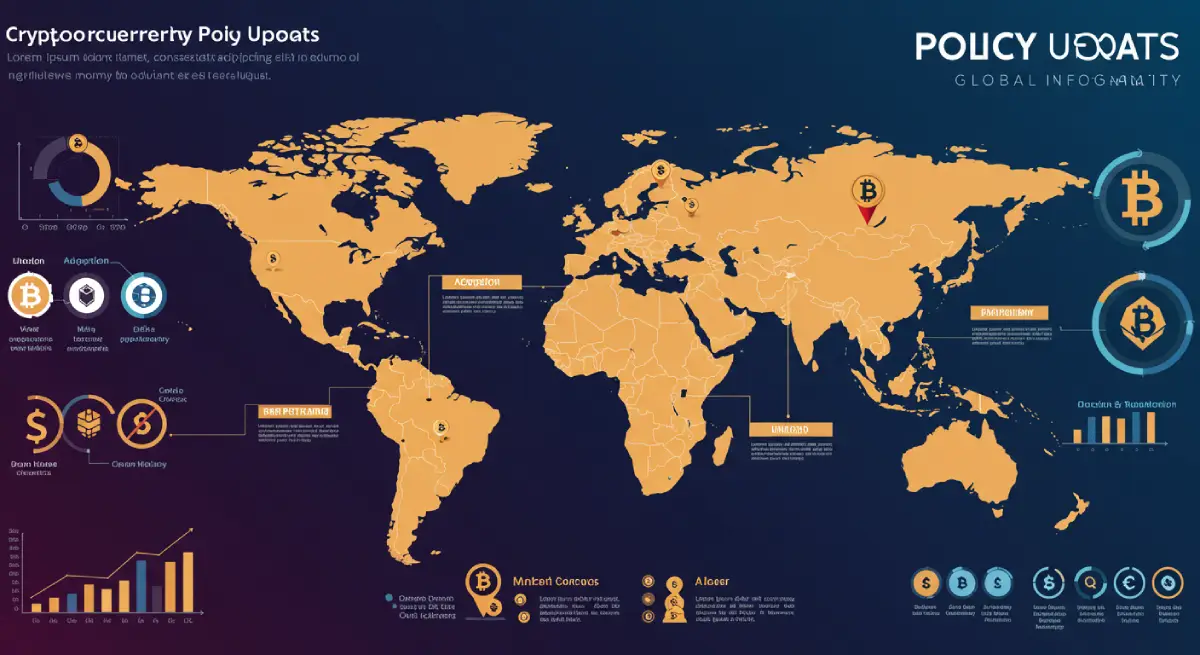Key Takeaways
- The United States is pushing for a crypto-friendly cryptocurrency policy, planning to include Bitcoin in national reserves.
- The European Union’s MiCA regulation is fully in effect, standardizing crypto asset markets across 27 countries.
- China permits personal crypto holdings but maintains strict bans on trading and mining.
- Japan eases stablecoin regulations and may adjust tax classifications to boost investment.
- South Korea enacts user protection laws and plans to monitor cross-border transactions.
- Singapore introduces Bitcoin perpetual futures, solidifying its crypto financial hub status.
- The UAE allows Bitcoin for real estate purchases and explores reserve potential.
- The UK plans a comprehensive regulatory framework covering stablecoins and staking.
- Russia pilots a three-year crypto investment experiment for “specially qualified” investors.
- El Salvador shifts its Bitcoin legal tender policy to voluntary acceptance.
These shifts both drive cryptocurrency innovation and spark debates over regulation and market stability.
Detailed Policy Updates
United States
- Policy Background: Since 2021, when the Biden administration tightened compliance for crypto exchanges, U.S. cryptocurrency policy has evolved from restriction to gradual openness. The Trump administration has markedly shifted toward support.
- Latest Update: In March 2025, Trump announced the “Crypto Strategic Reserve Plan,” incorporating Bitcoin (BTC), Ethereum (ETH), Ripple (XRP), Solana (SOL), and Cardano (ADA) into national reserves. The plan leverages approximately 200,000 BTC (worth about $20 billion) seized through law enforcement actions, with potential future purchases under consideration. Additionally, the Financial Innovation and Technology for the 21st Century Act (FIT21), passed by the House in May 2024, awaits Senate approval to clarify whether cryptocurrencies are commodities or securities.
- Specific Measures: A Digital Asset Market Task Force was established to ease banking access for crypto firms; the SEC relaunched its crypto task force to streamline registration and disclosure processes.
- Impact: This could attract institutional capital and enhance U.S. competitiveness in the global crypto market, though critics warn of heightened speculative bubbles.
- Source: Trump’s Crypto Reserve Plan
Japan
- Policy Background: Since recognizing Bitcoin as a legal payment method in 2017, Japan has been one of Asia’s most crypto-friendly markets with a robust regulatory framework.
- Latest Update: In early March 2025, Japan’s cabinet approved the Crypto Reform Bill, submitting it to the National Diet. The bill relaxes restrictions on brokers and stablecoins, permitting government bonds (e.g., yen-denominated bonds) to back stablecoin issuance. A 2025 fiscal year tax reform proposal may reclassify cryptocurrencies from “miscellaneous income” to “financial assets,” reducing tax rates.
- Specific Measures: The Financial Services Agency (FSA) and the Japan Virtual Currency Exchange Association (JVCEA) are enforcing the “Travel Rule,” mandating large transaction reporting.
- Impact: Eased stablecoin rules could attract global firms, and tax changes may spur retail investment, though short-term market volatility could arise during the transition.
- Source: Japan’s Crypto Reform Bill
United Arab Emirates (UAE)
- Policy Background: The UAE, particularly Dubai, has emerged as a global crypto hub through blockchain strategies and lenient policies, drawing significant business and investment.
- Latest Update: Since 2018, the UAE has permitted Bitcoin for real estate purchases, with this policy clarified as a nationwide guideline in March 2025. Rumors suggest the UAE holds 300,000 to 400,000 BTC (approximately $30–40 billion), with discussions underway to include it in national reserves.
- Specific Measures: In December 2024, the Virtual Assets Regulatory Authority (VARA) approved the AE stablecoin for payments and investments; the “UAE Blockchain Strategy” aims to blockchain 50% of public services by 2030.
- Impact: Bitcoin’s real estate utility strengthens its adoption, and reserve talks could fuel a Middle Eastern crypto boom, though the rumors remain unconfirmed.
- Source: UAE Allows Bitcoin for Real Estate
China
- Policy Background: China banned crypto trading and ICOs in 2017 and outlawed mining in 2021, yet it supports blockchain technology development.
- Latest Update: In November 2024, a Shanghai court ruled cryptocurrencies as legal property, removing legal risks for personal holdings. However, trading, mining, and commercial activities remain strictly prohibited, with banks required to monitor related fund flows.
- Specific Measures: The government is accelerating its digital yuan (e-CNY) rollout, piloted in over 30 cities; stricter internet blocks target offshore crypto exchange access.
- Impact: Relaxed personal holding rules may reflect a compromise with global trends, but commercial bans limit market growth, creating policy interpretation divides.
- Source: China Relaxes Crypto Holding Restrictions
Spain
- Policy Background: Spain’s crypto regulations have been relatively lenient, requiring exchange registration since 2021, though traditional financial institutions have been slow to engage.
- Latest Update: In March 2025, Spain’s second-largest bank, BBVA, received regulatory approval to offer Bitcoin and Ethereum trading and custody services via its mobile app.
- Specific Measures: Initially targeting high-net-worth clients, the service will expand to all users; BBVA partners with crypto platforms to ensure compliance and security.
- Impact: Traditional banking’s entry could boost European crypto adoption, though limited initial coverage requires market response monitoring.
- Source: BBVA Offers BTC and ETH Trading

Thailand
- Policy Background: Thailand has regulated crypto exchanges since 2018, gradually easing restrictions to attract investment.
- Latest Update: In March 2025, the Thai SEC approved Tether (USDT) as a compliant cryptocurrency for trading and payments on regulated exchanges, effective March 16.
- Specific Measures: Exchanges must adhere to anti-money laundering (AML) requirements; the SEC plans stablecoin regulatory guidelines to support cross-border payment innovation.
- Impact: This enhances Thailand’s Southeast Asian competitiveness, though USDT’s centralized nature may spark trust concerns.
- Source: Thailand Approves USDT
Singapore
- Policy Background: Known for its tax-friendly policies and innovative climate, Singapore has lured numerous crypto giants to establish headquarters.
- Latest Update: In the second half of 2025, the Singapore Exchange (SGX) plans to launch Bitcoin perpetual futures for institutional and professional investors, excluding retail clients.
- Specific Measures: The Monetary Authority of Singapore (MAS) has licensed 19 crypto service providers; guidelines encourage blockchain innovation while curbing retail marketing.
- Impact: This strengthens Singapore’s financial hub status, though retail exclusion may prompt fairness debates.
- Source: SGX to List BTC Futures
European Union (EU)
- Policy Background: The EU began discussing crypto regulation in 2018, adopting MiCA in 2023 to address rapid market growth.
- Latest Update: The MiCA regulation took full effect on December 30, 2024, governing crypto asset issuance, services, and market abuse across 27 member states.
- Specific Measures: Stablecoin issuers require licenses; exchanges must record transaction identities (starting 2026); emphasis is on preventing money laundering and fraud.
- Impact: A unified framework could set a global benchmark, though varying national implementations may affect consistency.
- Source: EU’s MiCA Law in Effect
Brazil
- Policy Background: Brazil’s crypto market has surged recently, with an initial regulatory framework passed in 2022.
- Latest Update: Brazil’s Central Bank is refining the Crypto Assets Bill, tightening oversight of virtual asset service providers (VASPs), with a detailed proposal expected by late 2024.
- Specific Measures: VASPs must register and submit AML reports; the bank plans a digital real (CBDC) pilot.
- Impact: Enhanced market safety could attract international investment, though regulatory costs may hinder small firms.
- Source: Brazil’s Central Bank Regulations
South Africa
- Policy Background: South Africa’s crypto regulation began late, integrating it into financial services in 2022.
- Latest Update: Starting February 12, 2025, Google mandates that South African crypto advertisers register with the Financial Sector Conduct Authority (FSCA) and obtain certification.
- Specific Measures: The FSCA tightens exchange licensing; a consumer education program aims to prevent scams.
- Impact: This protects consumers from fraudulent ads but may limit small firms’ promotional reach.
- Source: South Africa’s Google Ads Policy
Conclusion and Trends
The cryptocurrency policy updates of 2025 reveal three key trends:
- Innovation-Driven: Japan, Singapore, and the UAE advance markets through tax reforms and derivatives.
- Regulatory Balance: The EU, UK, and South Korea establish frameworks to mitigate risks while fostering compliance.
- Divergent Attitudes: The U.S. and UAE explore national reserves, while China remains cautiously open.
These shifts present opportunities and challenges for investors and businesses. Want to stay ahead on global crypto regulation? Subscribe to our newsletter for the latest insights! We’ll deliver up-to-date cryptocurrency policy updates and exclusive analysis straight to your inbox!
Tags: #TrumpPolicy #CryptoFuture


